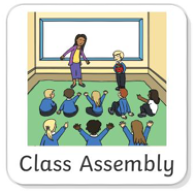Tuesday
Early morning work
Using adjectives
An adjective is a word that describes a noun (the name of a thing or a place).
It was a terrible book.
The word 'terrible' is an adjective. It tells us what the book (the noun) was like.
The book she read on holiday was terrible.
or
She read a terrible book on holiday.
Adjectives can come before or after a noun.
Try putting adjectives in different places in your sentences to make your writing more interesting.
She had a mouldy, smelly, overpriced sandwich.
If you want to describe a noun in detail, you can use more than one adjective.
When you have a list of adjectives like this, separate them with commas.
Task: 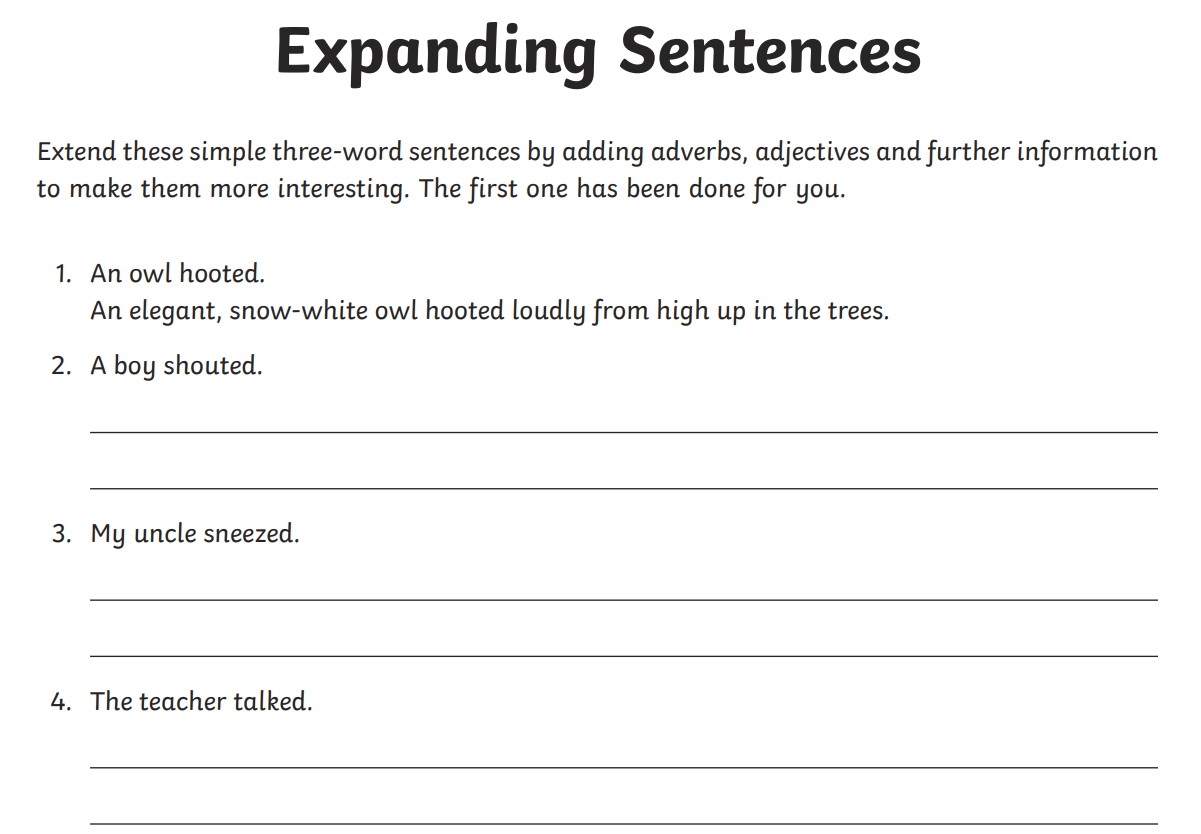
Reading
RIC
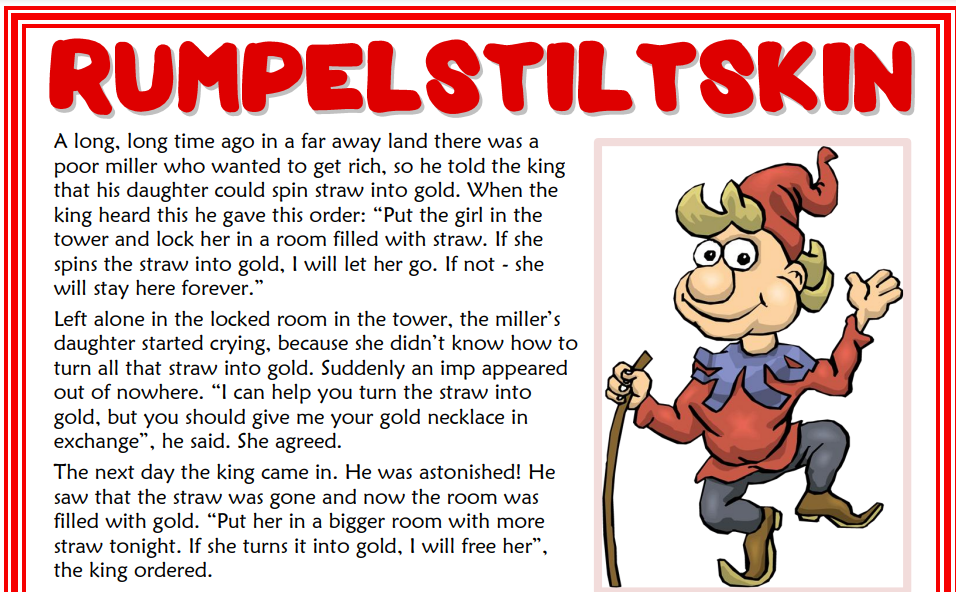
R- What did the girl give to the imp in return for his help?
I- Why was the king astonished?
C- Why did the author use the word, 'long' 2 times together in the first sentence?
Tuesday 29th October 2024
LC- To identify the main ideas from more than one paragraph.
Read the first retelling of Rapunzel from the English page.
We are then going to take the most important information so we can summarise the story. We will model how to do this for the first few paragraphs.
Teacher model
There once lived a man and a woman who always wished for a child, but could not have one. These people had a little window at the back of their house from which a splendid garden could be seen. The garden was full of the most beautiful flowers and herbs. It was, however, surrounded by a high wall, and no one dared to go into it because it belonged to an witch, who had great power and was feared by all the world.
One day the woman was standing by the window and looking down into the garden, when she saw a bed which was planted with the most tasty rapunzel. It looked so fresh and green that she longed for it and had the greatest desire to eat some. This desire increased every day. The woman knew that she could not get any of it and grew more pale and miserable each day.
Her husband was worried about her and asked "What is wrong my dear?"
"Ah," she replied, "if I can't eat some of the rapunzel from the garden behind our house I think I shall die."
The man, who loved her, thought, "Sooner than let my lovely wife die, I will bring her some of the rapunzel myself, no matter what the cost."
In the twilight of the evening, he climbed over the wall into the garden of the witch, hastily grabbed a handful of rapunzel and took it to his wife. She at once made herself a salad and ate it happily. She, however, liked it so much -- so very much, that the next day she longed for it three times as much as before. If he was to have any rest, her husband must once more descend into the garden. In the gloom of evening, therefore, he set out again; but when he had climbed over the wall he was terribly afraid, for he saw the witch standing before him.
Your turn.
Summarise the full story. Remember to take the most important information and write it in your own words.
English
LC: To read and discuss a range of fairy tales.
Task: discuss and write about the characters, plot and setting for Rupunzel and for Rumplestiltskin.
t t 5345 rumpelstiltskin story powerpoint ver 5.pdf



Maths
29.10.24
LC- To subtract using mental strategies.
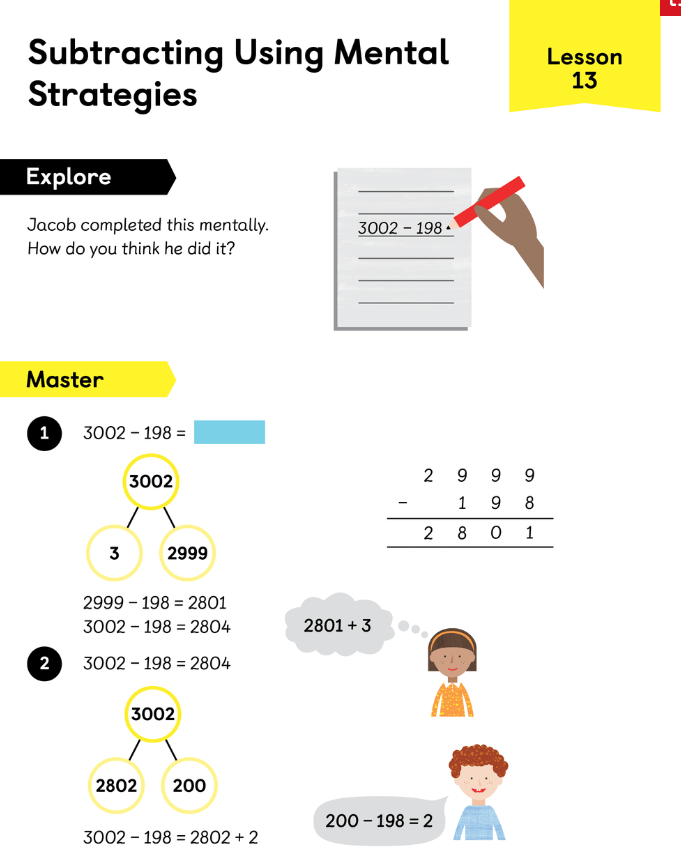
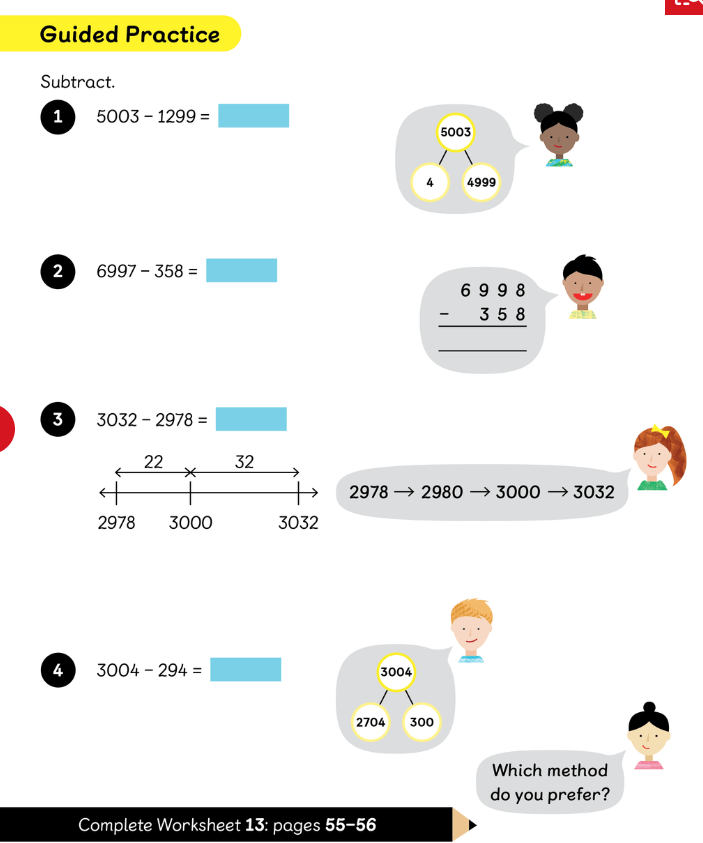
RE
Tuesday 29th October 2024
LC: To identify morals in fables.
Why do fables have morals or lessons?
Fables, also known as short stories for kids, are based on fictional characters, which are usually animals. Almost all fables and short stories for kids have morals or lessons.
This is to teach children and other listeners the difference between right and wrong and to teach them about acceptable behaviours and manners.
In summary, these are the characteristics of a fable and short stories for kids:
- All fables are fictional.
- Fables are short and usually have a few characters involved.
- The characters found in fables are usually animals with human attributes.
- There is always a lesson or moral to be taught and learned from fables.
How do fables help you learn better?
Every fable or short story has a valuable lesson to be learned, which can be carried through each child’s life. The lessons taught through short fables with morals help children develop their discernment and judgement skills.
The fictional animal characters that are found in fables can help children identify errors and faults that human beings have in their characteristics and behaviours. This may not be easy to recognise and identify in human characters.
Fable stories about animals with a moral lesson
These fable stories about animals with moral lessons have been spread amongst children for hundreds of years, and are still used to this day to share valuable life lessons.
Task:
In your own words explain what the word moral means:
The word moral means
Next, read the short fables below and explain the moral of each fable in your own words.
t t 11538 the tortoise and the hare powerpoint ver 5 2 .pdf
us e 309 the boy who cried wolf story powerpoint ver 3.pdf
t t 14251 the lion and the mouse powerpoint 2 .pdf
Collective worship
The Time of Our Lives
Time is precious - don’t waste it!
LC: To reflect on the fact that time is important and should be used wisely.
- Let me tell you a riddle written by J.R.R. Tolkein, author of the Lord of the Rings trilogy. See if you can work out what the answer is.
What is it that overwhelms everything: birds, beasts, trees, flowers; gnaws iron, bites steel; grinds hard stones to meal, slays kings, ruins towns; and beats the highest mountains down?
Answer:
- Time is the most precious commodity we possess, but it moves on relentlessly and nothing we can do can stop it, slow it down or reverse it. All we can do is measure it, waste it or use it wisely.
- In the past, time was measured using the elements of sun, water, fire and sand, in the form of sundials, water clocks, candle clocks and hourglasses - also known as egg timers. Then mechanical clocks were created: grandfather clocks, pocket watches and wristwatches. More recently, digital clocks were invented and technology has moved on so quickly that many people no longer wear watches, simply using their phones or other gadgets to tell the time.
Earlier in history, telling the time was something people had to estimate. Today, though, we can tell the time incredibly accurately, to within microseconds! - Of course, regardless of how we measure it, time seems to go by quickly or slowly depending on what we are doing. If you’re stuck in bed with chickenpox, for example, time seems to drag. If you’re at an amusement park, though, it flies by and, before you know it, it’s time to go home.
- Raise your hands if you feel that you spend too much time in school. Well, I am going to demonstrate that you don’t really have time to come to school at all!
- I want you to concentrate now and try to keep up with the calculations I will do in just a moment.
Sums:
There are 365 days in a year. You have, on average, 13 and a half weeks' holiday in a year, which is 95 days.
So . . .
365 - 95 = 270 days.
On average, you sleep for nine hours each night. In a year, this makes 3,285 hours, which is the same as 136 days.
So . . .
270 - 136 = 134 days.
You spend about two hours of every day eating. In a year, this makes 730 hours, which is the same as 30 days.
So . . .
134 - 30 = 104 days.
You don’t come to school on Saturdays and Sundays, though, and, with 52 weeks in a year, that makes 104 days.
So . . .
104 - 104 = 0.
So, in fact, as I said, you don’t seem to have time to come to school at all! - Can you work out what is wrong with my calculations?
- The conclusion from this calculation, therefore, is inaccurate – but it does make the point that time is precious.
How we tell the time is very interesting, but it is not as important as how we use our time. Do we use it thoughtlessly - being irritable and grumpy when we can’t have your own way - or do we use it thoughtfully - being happy and making the most of life?
Time for reflection
There is a famous passage in the Bible - Ecclesiastes 3.1–8. It emphasizes the importance of time and challenges us to spend our time wisely.
If you have organized a reader, invite him or her to read the following passage at this point.
There is a time for everything, and a season for every activity under the heavens:
a time to be born and a time to die,
a time to plant and a time to uproot,
a time to kill and a time to heal,
a time to tear down and a time to build,
a time to weep and a time to laugh,
a time to mourn and a time to dance,
a time to scatter stones and a time to gather them,
a time to embrace and a time to refrain from embracing,
a time to search and a time to give up,
a time to keep and a time to throw away,
a time to tear and a time to mend,
a time to be silent and a time to speak,
a time to love and a time to hate,
a time for war and a time for peace.
Prayer
Dear God,
Thank you for our lives and the opportunities that come our way.
Please help us to be good stewards of your precious gift of time.
Please grant us the wisdom to use our time wisely.
Amen/ Ameen.







